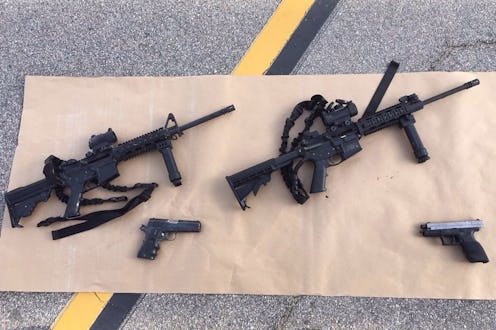The Dec. 15 GOP presidential debate will likely address the San Bernardino shooting, and relate it back to the attacks in Paris, in an attempt to address both Islamic terrorism and gun control — two issues which the Republican party maintains are unrelated. The Republicans' last debate, which aired Nov. 10 on the Fox Business Network, preceded both these incidents. This next round, the last of the calendar year, will provide the ultimate arena for using both events to discuss terrorism and gun laws.
Based on comments following the shooting, Republicans will continue to staunchly support the Second Amendment and resist stricter gun laws. The bigger question is whether the party will perpetuate its tendency to further a Western narrative that rejects Islam. And that in itself should concern viewers.
When it comes to guns, the GOP candidates will appease party interests by defending the Second Amendment at all costs in order to maintain a strong constituency among right-wingers. Democratic candidates, however, have largely condemned the United States' lax gun laws. Florida senator and Republican candidate Marco Rubio's statement after the Paris attacks illustrates the party lines:
Forty-eight hours after this is over they’re still out there talking about gun control measures ... As if somehow terrorists care about what our gun laws are. France has some of the strictest gun laws in the world and they have no problem acquiring an arsenal to kill people.
Gun control laws represent one of the largest chasms between the ideologies of the Republican and Democratic candidates. Following the San Bernardino shooting, the candidates immediately took to Twitter to express their condolences and request prayers for the families affected. Meanwhile, the Democratic candidates called for stricter gun control laws. Republican responses looked much like that of Jeb Bush:
While Democratic responses looked much like that of Hillary Clinton:
On the Friday following the shooting, Ted Cruz traveled to a shooting range in Johnston, Iowa, believing that it was appropriate to praise the availability of weapons less than a week after the tragedy. He framed the shooting as a battle between good and bad guys, though terrorist tactics are considerably more complicated.
We need to target the bad guys. But on the flip side, what keeps us safe is we are free people who have a God-given right to protect our homes and our families and our lives.
Carly Fiorina echoed Cruz's disapproval of the Democrats' call for stricter gun control laws in an address she also made shortly after the shooting.
Hillary Clinton was tweeting about gun control while we learned that radical Islamic terrorists have been building pipe bombs.
In other words, Fiorina is suggesting that radical Islam, and not guns, are the problem. Here's where the fine line which the Republican party seems to frequently cross comes into play. The Republicans' responses to the Paris attacks and the San Bernardino shooting should come as equally unsettling, because their rhetoric has the potential to spark more anti-Islamic sentiment. Perceiving these events as a call to take up arms and protect the nation, Republican candidates have adopted an increasingly bellicose attitude. The night following the San Bernardino shooting, New Jersey Gov. Chris Christie declared that the world is at war, and reinforced the importance of these events in the next debate:
The entire campaign changed a few weeks ago ... We need to come to grips with the concept in America that we are in the midst of the next world war.
Christie isn't wrong in saying that we need to combat Islamic terrorism. But with hate speech against Muslims being spewed by Donald Trump, preventing an ideological war against Islam is paramount. The next GOP debate will tell whether Republicans will attempt to unite the country or exacerbate its divides while contemplating recent events.
